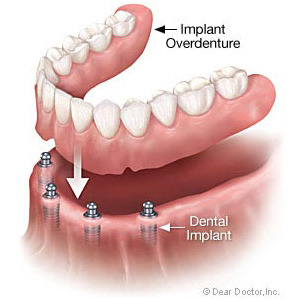Implant supported overdentures are one of the best and the least expensive options to replace missing natural dentition. It is centered around the idea of using minimum number of implants and a removable denture to replace a full set of dentition. Here a denture is used to replace the teeth, the gums and some of the missing bone and the implants are used to hold the denture in place so it does not come out.
You will walk out of the office with a full set of temporary teeth so you will never be without teeth. The temporary denture will allow healing of the implants, the bone and the gums and also allow you and our team to test drive the bite, fit, shade, speech, etc. We will switch over the temporary denture in 3-6 months to the permanent one that will start utilizing the implants which should last you a long time if you maintain it.
Dr. Novin has been performing this procedure since 2016 successfully and is specially trained in this. The following radiograph is of a case done at our office.


Process:
- Pre-surgical assessment:
- Clinical examination and consultation with one of our dentists.
- Records: 3D scans, impressions and photos.
- Pre-prosthetic Phase:
- You will meet with either one of our dentists or denturists who will determine the best option for your temporary prosthesis.
- Surgical Phase:
- Extracting any existing teeth that are determined to be remove and smoothening of bone to create an even surface for the implants in the basal bone.
- Installation of 2-4 implants as per the pre-determined plan.
- Fitting of a temporary denture to avoid interfering with the healing of the implants.
- Recovery Phase:
- The temporary denture will be relined (fitted again) as the bone and the gums shrink with healing.
- Radiographs, examinations and adjustments as necessary over the next 3-6 months to ensure properly healing.
- Prosthetic Phase:
- Replacing temporary denture to the final permanent denture with or without a metal framework to fit on to the implants.
Advantages:
- Applicable to most cases even when previous implants have failed and there is very limited bone remaining.
- Gives you teeth in a day with minimal preparation time.
- Surgery time is reduced when used with surgical guides and a multi-disciplinary team.
- Least expensive full mouth implant option.
- Highly aesthetic and functional.
- Loss of one of the implants does not compromise the case.
- Requires the least maintenance.
- Easy and inexpensive to repair.
Disadvantages:
- Denture needs to be removed, cleaned every day a couple of times and should stay out of the mouth at night.
- Has to be designed well to allow proper oral hygiene.
- Temporary dentures do not fit well as the gums and the bone heal and need adjustments over time.
- Eating in the first 3-6 months of healing is limited to soft foods and semi-solids.
- Denture will partially cover the roof of the mouth and interfere with taste slightly.
- The retention elements of the denture need to be replaced every 6-12 months as they are consumables.
Maintenance
- You will need to come to the office at least once a year to have retention elements changed and the denture relined or cleaned.

